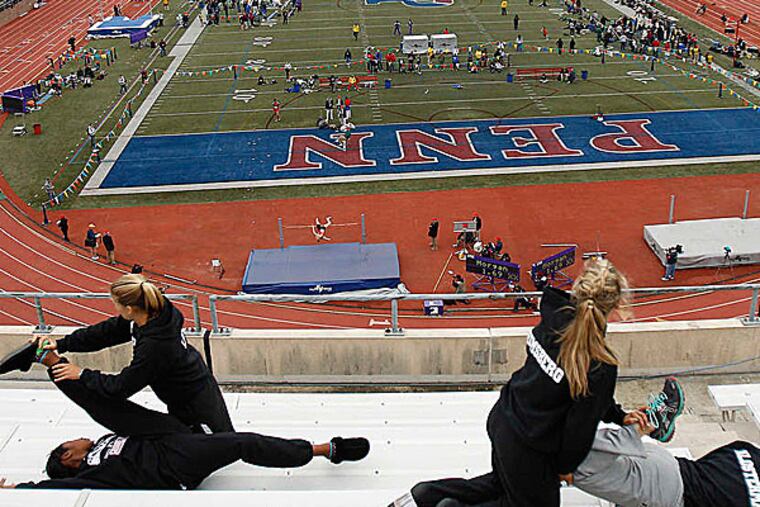One test at Franklin Field: The Penn Relays hubbub
The men and women who run in the collegiate events at the Penn Relays face so much more at the carnival than the opportunity to compete on the track at Franklin Field for precious seconds out of a three-day, 36-hour, 250-event spectacle.

The men and women who run in the collegiate events at the Penn Relays face so much more at the carnival than the opportunity to compete on the track at Franklin Field for precious seconds out of a three-day, 36-hour, 250-event spectacle.
There are distractions and changes from a normal track meet that tend to throw off newcomers and athletes who aren't tough-minded. Coaches like to see how their runners handle the commotion and difficulties at Penn, experiences that prepare them for future meets.
"They don't really create challenges, they create opportunities," South Carolina coach Curtis Frye said Wednesday through Skype at a news conference advancing the 120th carnival, which begins next week.
"The kids who manage those situations . . . the best have been the kids that do the best later on," Frye said. "It's a good chance for us to see people panic, those who don't panic, people who get to the warm-up field on time or can find an excuse for not being there. So, there are things we learn about our kids."
Before their races, the runners must warm up outside the stadium at one of several locations. Then, they must remove their sweats at the southwest corner of the stadium before walking across to the north side, where they gather in the paddock to await their events. It's not an ideal situation, especially on a cold or rainy day, but the athletes must handle it.
Texas A&M coach Pat Henry said the environment at Penn "tests your strength and your resolve," and it tends to show an athlete's strengths and weaknesses.
"It's warming up and cooling down after events and being aware of the time schedule, being aware of when you run the next time and taking care of yourself and not having planned meals and learning how to eat and learning how to fuel your system," Henry said. "All of those are challenges that Philadelphia presents, and that's good for us."
First-year Texas coach Mario Sategna, who has been to several carnivals as a Longhorns assistant, called it "a unique environment.
"You deal with different elements when it comes to the climate and whatnot," he said, "but we kind of embrace that, because you never know what you're going to get down the road. These are valuable experiences."
Extra laps
Dave Johnson, the director of the Penn Relays, said the carnival will host more than 250 colleges, a record number, and more than 1,000 high school teams from the United States and seven other countries. The 2014 NCAA indoor champions, the men's and women's teams of Oregon, will be there.
Penn's new Irving "Moon" Mondschein Throwing Complex, named in honor of the university's longtime track and field coach, will be dedicated on April 26, the final day of the carnival. Mondschein spent 14 years as an assistant coach of the Quakers and eight years as their head coach, and coached the 1988 U.S. Olympic team.
"He left a tremendous impact on the program," said Penn women's track and field coach Tony Tenisci, who has spent nearly 30 years as the team's throwing coach. "More than anything, we wanted his name on this facility."